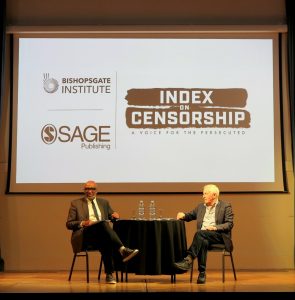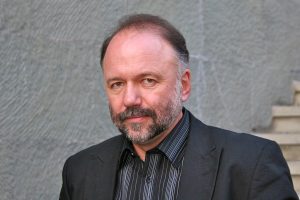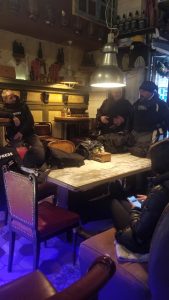Index relies entirely on the support of donors and readers to do its work.
Help us keep amplifying censored voices today.

Sir Trevor Phillips and Jonathan Dimbleby. Photo: Mark Frary
First I need to apologise, I should have written this blog last month but events in Ukraine have dominated all of our thoughts. But honestly the Russian invasion has caused the team at Index to not just react to the ongoing war but also think a great deal about our heritage and the similarities between events today and those that led to our founding.
For avid followers of our work it shouldn’t surprise you that the Index family have been delving into our history in recent months. Although we were launched as a British charity in 1971, the first edition of our award winning magazine wasn’t published until 1972. So on Tuesday March 15th we celebrated the 50th anniversary of the first publication of Index on Censorship magazine. And launched our souvenir edition of the magazine – reflecting on the last 50 years as well as looking forward to the new challenges we face.
Given the collective horrors of Covid-19 and Ukraine it was actually a joy to be able to come together. There was birthday cake, the odd glass of fizz and genuinely wonderful conversations with the people who collectively built our organisation. Conversations about our history and Index’s contribution to media, academic and artist freedom around the world during our half century dominated the chat. The extended Index family has made so many contributions to the society we cherish, protecting the core human right of free expression. From campaigning against libel tourism and SLAPPs to publishing the work of some of the most important dissidents of the last five decades.
The highlight of our birthday party was listening to our current Chair, Sir Trevor Phillips, discuss the historic and current challenges to freedom of expression around the world with our former Chair, Jonathan Dimbleby. Their collective contribution to media and academic freedoms are numerous and have been vital to protect these most basic of freedoms both in the UK and further afield.
In the midst of a war on European soil and the likely beginnings of a new Cold War, being able to reflect on our beginnings was both timely and heartbreaking. In the months ahead the professional staff at Index will again be refocusing our work on the areas that led to our founding from Ukraine to Belarus, Russia to China. We never stopped providing a platform for the persecuted in each of these countries but our work will need a renewed focus as we strive to make sure that those being persecuted by increasingly repressive regimes have a voice.
If you are interested in our history, you will want to read the 50th anniversary of our magazine.
Oleksandra Matviichuk is head of the Centre for Civil Liberties in Kyiv. She recorded this video for Index on Censorship to appeal to the international community to act over Russian abuses of free expression in the Ukrainian territories occupied by Russian troops since 24 February. She is particularly concerned with beatings and abductions of protesters and journalists in cities in the southeast of the country and names Khakova, Mariupol, Kherson and Berdyansk in her powerful testimony.
Index has been working closely with members of the Ukrainian media and civil society since the outbreak of the conflict. It is our intention to build a network of journalists, writers and artists in Ukraine itself and in the diaspora to help keep the outside world informed.
Index was inspired by dissidents in Russia and Czechoslovakia who protested against the Soviet invasion of 1968. We are proud to stand by those who continue to fight for freedom of expression in Ukraine today.

Celebrated Ukrainian author Andrei Kurkov. Photo: Juerg Vollmer
After five days of silence, my friend, a writer, journalist, and historian in occupied Melitopol, finally sent me a message. I’d been afraid something had happened to her, that I would never hear from her again. But, thank God, it turned out that she’d simply had no internet access or telephone reception. I asked her to keep a diary of life under occupation, to take photos on her smartphone, and to send all that to me. I would keep it safe. The original diary could then be destroyed.
She’s been living under occupation for more than two weeks and doesn’t set foot outside, for fear of being captured. The director of the Melitopol History Museum, Leyla Ibragimova, a Crimean Tatar, has already been kidnapped. They terrorised her, interrogated her, confiscated her and her family’s phones and computers — then released her. The next morning they picked her up for another interrogation. Activists and journalists are disappearing in the occupied territories. FSB agents walk the streets with lists of names and addresses in hand. These lists were prepared before the start of the war.
Oleg Baturin, a journalist from Kakhovka, was abducted by the Russian military. Eventually, he was released — after eight days of beatings and torture, of demands to go over to the Russian side, of hunger and thirst, of humiliation. Those who beat him hid their faces and forbade him to raise his head and look at them. Is this today’s Russia? Yes. But it is also the Soviet Union of the 1930s. These are the practices of the Gulag. The Ukrainian author Stanislav Aseyev wrote an entire book about the torture camp in Donetsk. After two years of captivity in this camp and in the prison run by separatists, he had plenty of material. He studied closely those who beat and abused Ukrainian prisoners of war and others who had been seized on the streets and brought to this already infamous concentration camp, called “Isolation.” Years ago, the place had been a factory for the manufacture of insulation for electrical wires. Later, under the same name, it became a contemporary art centre. When the separatists, aided by the Russian military, captured Donetsk, they converted it into a concentration camp, with a set of chambers in which all their detainees were tortured. Stanislav Aseyev’s book has already appeared in several languages, including English. I highly recommend it to anyone who seeks to better understand what went on and continues to go on in the separatist “republics” since 2014. And now the same things are happening in the territories occupied by the Russian army.
We’re well into 2022. Books about what is happening now in Ukraine are already being written, but are not yet published.
The unsuccessful attempt to annex or, to put it plainly, occupy all of Ukraine has angered Putin and now, judging by the military actions of the Russian army, Russian generals have been ordered to destroy cities and villages, to kill civilians, and simply to make sure that Ukraine ceases to exist.
This is not the first attempt to destroy Ukraine and Ukrainians. In the late 1920s, Ukrainian peasants refused to join collective farms, and for this the Soviet government deported 250,000 families to Siberia. In 1932-1933, as punishment for the same individualism and unwillingness to become part of Soviet collective agriculture, all reserves of wheat and, indeed, all sources of nourishment were confiscated from Ukrainian peasants, leaving them with no food for the winter. Some seven million Ukrainians perished during this artificial famine organised by Moscow.
In those same years, the Soviet government decided to destroy Ukrainian culture. Nearly all the country’s leading writers, poets, and playwrights were arrested, sent to Solovki in the north of Russia, and shot. In Ukrainian literary history, the authors of this period are referred to as the “Executed Renaissance.” These people had tried to revive Ukrainian culture after decades of official prohibitions on the use of the Ukrainian language and on anything distinctly Ukrainian in tsarist Russia. Soviet communists had decided that the revival of Ukrainian culture posed a danger to the Soviet Union. And alongside the writers, poets, and playwrights they executed, the NKVD also shot many artists and theatre directors. The works of Mykhaylo Semenko (1892-1937), Maik Yohansen (1895-1937), Mykola Zerov (1890-1937), and dozens of other Ukrainian writers killed in that purge could only be published again after the collapse of the USSR.
Today’s Ukrainian intellectuals face the same danger. That goes for writers and journalists and historians. Anyone who believes that Ukraine should remain independent and become part of Europe is already an enemy of Russia. Culture is what cements a nation. Ukrainian culture has only just begun to revive after 70 years of Soviet rule, 70 years of censorship and persecution.
But today that culture and its representatives are the targets of Russian bombers. The attacks on Kyiv have killed Artem Datsyshyn, the principal dancer of the National Opera of Ukraine, and the famed actress Oksana Shvets. Near Kyiv, in the village of Bucha — home to a number of writers and composers— Oleksandr Kislyuk, a well-known translator from Ancient Greek and other languages, a teacher at the Theological Academy, and a professor at the Drahomanov Pedagogical University, was shot by Russian soldiers on the threshold of his house. It is thanks to him that Ukrainians can read the works of Aristotle, Tacitus, Thomas Aquinas, and other classic authors in their own language.
Now Oleksandr Kislyuk has been murdered and one wonders who will finish the translations he was working on in his final days.
Among those killed in this war are at least three painters. There are also photographers and scientists, musicians and architects, schoolteachers and university professors.
For almost a month, now, Russian bombers have been aiming directly at schools and universities, theatres and libraries.
Near Kyiv, in the village of Ivankiv, a bomb hit a historical museum that housed the works of famous Ukrainian primitive artist Maria Prymachenko (1909-1997). While the museum burned, locals carried her paintings out of the fire. Now those canvases are kept in the homes of people who live next to the ruined museum.
The Ukrainian Ministry of Culture has sent an order to all museums to prepare their exhibits for evacuation to Western Ukraine. Some museums managed to pack up their collections, others simply lowered them into basements and underground rooms. But none have so far been evacuated. The most important thing is to evacuate people from cities under constant bombardment and artillery fire.
For two weeks, Ukrainian writers tried to extract their colleague, the Russophone prose writer Volodymyr Rafeyenko, from the village of Klavdiyevo, which was practically destroyed by the Russian army. He is a refugee twice over. First, in 2014, he had to leave his apartment in Donetsk. Since then, he and his wife had been living in Klavdiyevo, at the dacha of the Ukrainophone writer and translator Andriy Bondar. Klavdiyevo has been all but flattened by Russian artillery and is surrounded by their tanks. Volodymyr and his wife spent more than a week in the basement of a half-collapsed house. At long last, they managed to break out of encirclement and volunteers took them to Kyiv.
Kyiv is also being hit by rockets, but not so intensively. The chances of survival are greater in Kyiv. There, in his apartment near the railway station, the publisher Mykola Kravchenko* sits at his table and works. He’s editing a novel by a young woman from Lutsk, titled Porcelain Doll. The novel concerns domestic violence. He knows that he won’t be able to publish it anytime soon, but he continues to work in order to preserve his psychological balance, in order to think less about the war.
Yet the war, including the violent attack on Ukrainian cultural heritage, continues. The number of bombed-out churches is already in the tens.
The Ukrainian Ministry of Culture is still at work and every day its employees collect new information about the historical sites and cultural institutions destroyed by the Russian army.
The list of Russia’s crimes against Ukrainian culture is constantly being updated.
* Editor’s note: Not the Ukrainian political figure of the same name who died in the early days of the Russian invasion of Ukraine.

Photo: Reporters inside Kyiv’s Buena Vista Social Bar
There’s always a bar. In Kyiv, in 2022, it’s the Buena Vista Social bar, bang next to a Ukrainian police checkpoint which is both funny ha-ha and funny peculiar because there is a nationwide ban on the sale of alcohol. Sssh. It’s a joyful shebeen, Cuban-themed, run by Maks, and you never quite know what’s available to drink and who’s going to be there. All the women have a past; all the men have no future. You get the vibe.
Early on in the war, a fellow regular was a big bloke with a thick moustache and a mane of bubbly, curly hair, often seen with his fixer, a Ukrainian freelancer. I never spoke to him but I clocked him as someone who had presence, who was an interesting character, who I had probably seen in Sarajevo or somewhere like that. He was Pierre “Zak” Zakrzewski, she Sasha Kuvshynova, and they were both killed on 14 March 2022 when their vehicle came under fire in Bucha – pronounced Butcher – to the northwest of Kyiv. British journalist Ben Hall was wounded in the same attack. They were working for Fox News, something Zak, 55, who had been brought up in Ireland, had mixed feelings about. But he knew the risks of war too well and made a decision that working for a big corporate was better risk-management than being freelance. His co-workers at Fox loved him, giving him an award as “Unsung Hero” after he helped get Afghan freelancers out of Kabul.
Sasha was 24, bold and fiercely smart. After her death, her dad said that she learnt to read at the age of three and picked up English from reading restaurant menus while on family holidays. She was a fanatical photographer with five stills cameras, had founded a music festival for up-and-coming jazz musicians, worked as a DJ and wrote poetry. She wanted to make movies.
If you don’t like free expression in a democracy, you blow up the TV tower. The Kremlin’s first journalist victim was Yevhenii Sakun, 49, a camera operator for Ukraine’s LIVE station, on 1 March. The Russian army sent in four missiles in the evening, killing a worker in the TV tower complex and four civilians. The next morning I saw the people from the morgue take away the bodies of a middle-aged man and a mother and her child with my own eyes.
The most dangerous area of Kyiv is the northwest suburbs, where the Russian army’s offensive, driving down through Chernobyl, has come closest to the capital. Reporters seeking human stories, of refugees fleeing with their dogs on a lead or their cat in a box, went repeatedly to Irpin. Fearing further Russian advance, the Ukrainian army flooded the river plains near the suburb and blew up the most southerly bridge, leaving people to pick their way across the skeleton remains. Once beyond that crossing, there is a second bridge. That’s where US film maker Brent Renaud, 50, originally from Little Rock and formerly of the New York Times, found himself, filming refugees running for their lives. Brent knew what he was doing, having filmed and reported man’s cruelty to man in Iraq, Afghanistan, Libya: all the nice places.
At Irpin, at the second bridge, the Russian army shot him in the neck and he died of his wounds.
Oksana Baulina was one of those intensely brave Russians who were on Team Navalny before their champion was arrested on fake charges and the organisation broken up. Oksana, 43, was declared a “terrorist” by the Kremlin and had to flee Russia. She set up as a reporter and film maker in Poland and reported on the war. When Russian artillery smashed into a shopping centre in Podil, in the northwest of the city, she was killed.
To be honest with you I have done my best to avoid writing this piece for days now because it can only fill one with gloom to think of these brave truth-tellers sent early to their graves by the mobster in the Kremlin. But my pals and I in the Buena Vista are buoyed up the thought that we are in Ukraine exactly because Vladimir Putin does not want us to be here. And on that point, Mr Putin, do fuck off.
And the rum is good.
There is, also, the line from Tom Stoppard’s great play, Night And Day, which I quoted on Twitter while hurrying back from the bar just before – well, actually, just after curfew – had fallen. This, from memory, is how it goes, how the lover of the dead young journalist, played by Diana Rigg, killed on the frontline denounces the false romance of journalism, “it’s not worth the heart-break beauty queen or the crossword and it’s definitely not worth the leader.”
And the old hack, played by John Thaw, replies: “Yes, you’re right. But also the other thing. People do awful things to each other. But it’s worse in places where everybody is kept in the dark. Information is light. Information, in itself, about anything, is light.”
RIP Zak, Sasha, Yevhenii, Brent and Oksana.